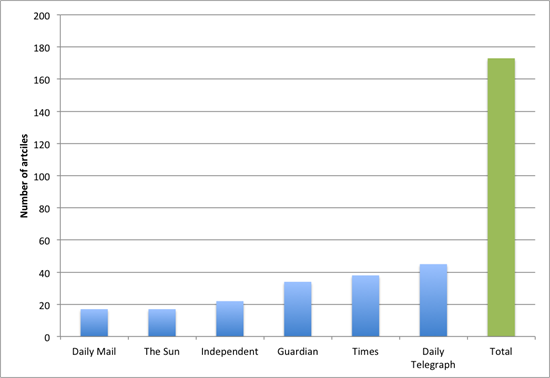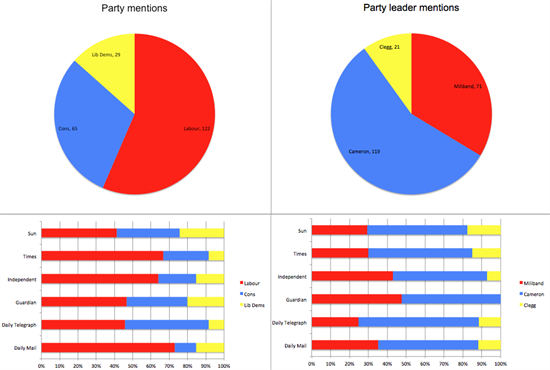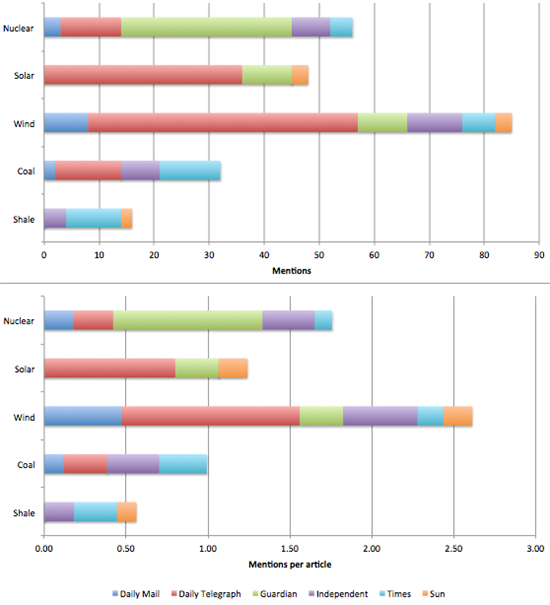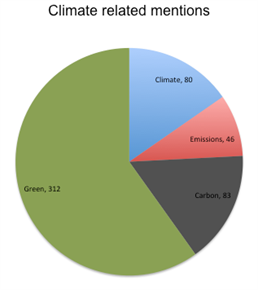Towards the end of 2013, you could barely open a newspaper without reading about energy price hikes: the number of stories containing the words “household energy bills” doubled in 2013 compared to the previous year. We look back at some of the key themes behind the headlines.
Energy bills
Energy companies’ decisions to raise prices once again in 2013 unleashed a torrent of media stories as politicians fell over themselves to propose market reforms.
From the end of October – when SSE announced the first price rise – to the end of the year, we found over 170 articles looking at household energy bills in six of the UK’s most-read daily newspapers. That’s more than four stories per day on average across the papers for two months.
The Daily Telegraph was responsible for the largest share of the articles we found – publishing 45 energy bills stories across 41 days. The Times and Guardian were close behind, publishing 38 and 34 stories respectively. The Daily Mail published the fewest stories of all the papers we analysed: 17 articles.
But how were journalists filling such a wealth of column inches? We did a quick word search to try and find out.
A political story
The search revealed a heavy political slant to the stories, with coverage of how each party proposed tackling the big six’s control of the energy market.
Labour leader, Ed Miliband, sparked a nationwide debate over whether the big six are giving consumers value for money in his speech to the Labour party conference last September. Miliband announced Labour’s plans to overhaul the market, including a 20 month freeze on energy bills if elected. It was a shrewd political move, though opponents described the plans as “economically ruinous”. Nonetheless, Miliband appeared to have tapped into the public mood.
Perhaps unsurprisingly, the stories mentioned Labour most of out of the three major political parties. The party’s price freeze promise continued to generate headlines months after its announcement, while its 10-point energy plan released in late November stimulated yet more coverage.
Miliband didn’t get his name in the papers as often as the Prime Minister, David Cameron, however. The Labour leader was mentioned 71 times across all the papers in stories on household energy bills, but Cameron was named 119 times.
That’s not necessarily good news for the prime minister, however. Many of the mentions came from journalists or opposition politicians criticising his response to Labour’s proposals. Still more mentions came amid a brief furore over allegations the prime minister had told colleagues to find ways to cut the “green crap” from household bills.
The prime minister denies he said it, but the government still announced it would move the cost of funding energy efficiency schemes – often referred to as “green levies” – off energy bills and on to general taxation two weeks later.
The Guardian’s environment editor, Damian Carrington, described Cameron’s positioning as a “rhetorical retreat” from his promise to make the current government the “greenest ever”. The Daily Telegraph likewise reported the difficulties Cameron had squaring his green credentials with reducing household costs.
A renewable energy story
As a result of the debate over green levies, renewable energy – and its future – was core to the coverage.
Journalists used variations of the word ‘renewables’ almost three times as often as ‘fossil fuels’ in stories on household energy bills:
The Daily Telegraph was particularly keen to link rising household energy bills to renewable energy sources – especially wind power. Many stories mentioned renewables were “paid for through levies on energy bills”, while discussion of the impact of the wholesale cost of gas – for example – was absent.
In contrast, shale gas – which caught the media’s imagination in 2013 – barely featured, even though many stories over the summer and since linked government attempts to stimulate the UK’s shale gas industry to the prospect of reduced energy bills.
In the articles we analysed, the media focused on the links between funding renewable energy and rising household energy bills. There was little reference to how the UK’s continued reliance on more polluting forms of energy affects costs.
Climate change missing
Despite the focus on the cost of green energy, little of the discussion revolved around climate change specifically.
The word ‘decarbonisation’ was largely absent. That could simply be because newspapers don’t use the term, but it could also indicate that the energy bills story has become detached from the wider climate change agenda.
While the words ‘climate’, ‘carbon’ and ’emissions’ appeared 219 times altogether, the word ‘green’ appeared 312 times – often when referring to levies to support renewables or energy efficiency schemes.
The Independent mentioned climate change most often – averaging one mention per story. The other five papers mentioned climate change at most in every other story, though often much less frequently than that.
Not over yet
2014 started much as 2013 ended, with Labour releasing analysis attacking big energy companies for excess profits. While the media’s attention to household energy bills is still far from the levels it reached at the end of last year, it will be interesting to see whether the debate continues to revolve around political, renewable energy, and broadly ‘green’ narratives – if it returns at all.
Methodological note
We used the Factiva archive to search for newspaper articles with the terms “energy bills” and at least one of “household” or “domestic”. These terms were chosen to try and limit the returned articles to those focused on household energy bills rather than the progress of the piece of legislation called the ‘energy bill’.
The search was limited to articles printed in the newspapers’ hard copies between 31st October and 31st December. The start date was chosen to avoid skewing the coverage towards Labour’s party conference, where Miliband first made his price freeze promise – arguably sparking the media’s attention to the issue.
Analysis was then undertaken using the online software, Textalyser. All the analysis in this blog is taken from statistics on the 1000 most frequent words in each of the newspapers’ articles. As such, the absence of a word from this analysis doesn’t necessarily mean it didn’t occur at all, but that it wasn’t one of the most frequent 1000 words.
When interesting terms were more than one word (such as “fossil fuels”), or were liable to have a number of variations (such as “renewable energy”/”renewables”), an ‘incomplete term’ search was conducted. For example, the term “renewab” for “renewable(s)” or “fossil” for “fossil fuels”. Given the context of the articles, we can be reasonably confident the returned results relate to the respective terms.
This sort of analysis is far from perfect - as we've discussed in detail here - but it does offer an interesting, statistical means of going behind headlines and high profile media stories. All the analysis presented here is undertaken with full acknowledgement of that caveat.






